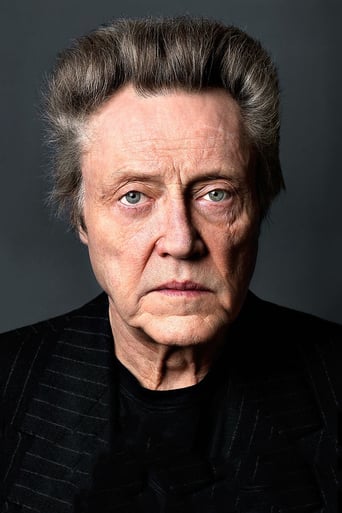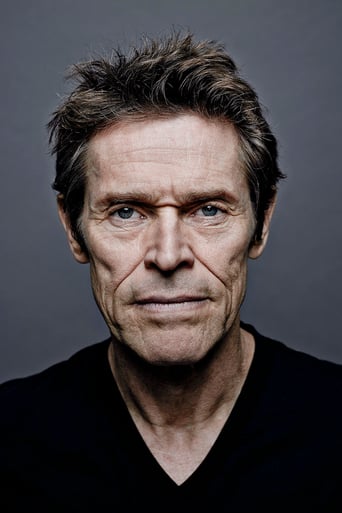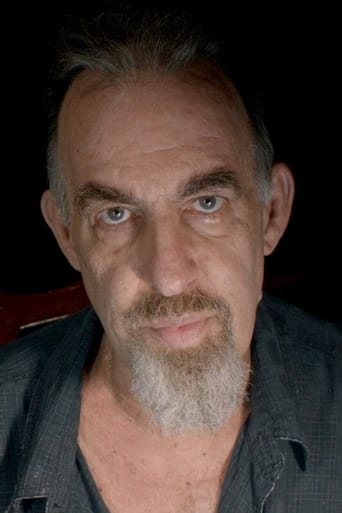Spidersecu
Don't Believe the Hype
Peereddi
I was totally surprised at how great this film.You could feel your paranoia rise as the film went on and as you gradually learned the details of the real situation.
StyleSk8r
At first rather annoying in its heavy emphasis on reenactments, this movie ultimately proves fascinating, simply because the complicated, highly dramatic tale it tells still almost defies belief.
Billy Ollie
Through painfully honest and emotional moments, the movie becomes irresistibly relatable
Shane Craig
I've told literally everyone that this one of the greatest films ever made. So why do I love it so much? I love how ahead of its time and immersive it is. I was having a conversation with my Dad the other day and he said he remembered it when it was first released in the US in 1999 (elsewhere in '98). He had an interest in seeing it, but it was pulled from theaters before he could. Grossing 0.02M, scoring a 19% on Rotten Tomatoes, and averaging a 4.9/10 User score on IMDB, the film couldn't find an audience for a time. I've read countless positive reviews from several years ago. That indicates to me that some were able to appreciate it, while most showed a cynical/ skeptical view. People weren't ready for this. Since I got my Letterboxd, I have seen it receive more recognition on that site. There are reviews that I've read on there that are among some of the best film analyses I've ever come across. IMDB, not so much. But a lot people seem to get it now and that makes me feel betteI love how brutally honest it is. There are things I see in this that reflect on our society today. For one: sexism. Almost every male character is a misogynistic asshole, but that doesn't mean I can't find any redeeming qualities within them. Many of the subtleties in the film reveal themselves on each viewing, but this concept was clear to me from the first time I saw it. Both Fox and X are blatantly sexist. One of the first examples I noticed was coincidentally, in the beginning. In the brothel, Fox watches Sandy. He inquires to the other guests about her, wondering who she is. The scene cross fades to Sandy's tattoo, presumably during the night that X first had sex with her. Fox arrives and says "So, what's her story?" X replies, "What do you mean?" Which Fox follows with, "She didn't say anything? She had your c*ck in her mouth the whole time or what?" Maybe some will disagree with me here, but I find it disrespectful that Fox has no problem having this conversation in front of a woman. Just as he did in the brothel when he told Madame Rosa he was a "women magnet." Even when Sandy walks into the room he doesn't change his attitude. When he comments on her "cheap shoes" and her outfit, this indicates to me that he's kind of a dick. Sandy clearly knows what she's getting herself into and is used to people being intolerant/sexist. I was surprised she didn't walk out when Fox said to X, "She doesn't meet guys everyday who offer her one million dollars to do what she did with you just now for what--a couple of hundred?" Talking about her as if she's not even there. I question X's behavior in this regard as well. We are lead to believe that he loves Sandy, but he makes fun of her with Fox in the restaurant. Once again, these characters don't have respect for women. It is a society where women are treated as toys. The next: Manipulation. Everyone is deceptive in the world of New Rose Hotel. Manipulation is the key to getting what you want. If it's about money or power, these people will do anything. The quote, "If you believe, then he will. You have to fall in love. That's the key to all of this." That reflects the whole film right there. Relationships aren't authentic. Everything is about sex or personal gain. In the flashbacks we see X with another girl after the orgy right in front of Sandy. Her response is to join in. Once again, it's all about sex.
The other: Journalism. You cannot prove anything that took place during this film. It is a reflection on secondary information and word of mouth. In this world, almost nothing is a reliable source. Even the scenes you saw, you cannot prove. My reasoning behind that is, when X is trying to make sense of everything that happened, the flashbacks show different takes than previously. This is not a mistake. This shows you that what you were previously lead to believe may have been wrong, or X's memory is distorted, or both. For example, in the beginning when Fox finds out about Hiroshi, he tells X: "I just found out Hiroshi's making plans to attend a conference in Vienna. I got the hotel where he's staying. It's his wife's favorite. Only--Hello--she won't be there. She's going to a spa." This conversation takes place in the brothel. However in the flashback he says: "I just found out Hiroshi's making plans to attend a conference in Vienna. I got the hotel where he's staying. It's his wife's favorite. Only--Hello--she won't be there. She's going to a convention." This isn't the only difference. Here, this encounter is in a totally different location than before. The final sequence is not only about this, but it also serves as X realizing he's been played. I love the character development. I notice more about X each time I watch it, but something I've picked up on is how he lets his desires override anything else. It doesn't take much to convince him of something if it involves money. When he tells Fox that he's "Through with it. No more Hiroshi." Fox says "Before you and I hooked up you had a helicopter flying over a smokestack, etc." He is trying to convince him that his previous job was insufficient and he needs to stay with corporate defectors. X just nods his head and smiles. Fox barely said anything and yet he goes along with it. That is because money is one of his desires and he will do anything to get it. Going back to his memories of Sandy's deception: There is a scene where she is asleep and he spots the card for the synthesizer in her passport, along with several identities other than the one they had discussed (Angelica De Mayo). When he is reflecting on this, he remembers that he didn't take action when seeing that she was going to betray them. Because he is allowing his lust for women to overtake this. I don't think I've ever seen such a character arc. It's incredible. To have a strong arc, a character should learn something or change in some way. X has learned that these desires: the money, the women, the things he keeps submitting to, have cost them their $100 million and Fox's life.
On my first viewing I didn't quite wrap my head around the surveillance footage. It was on re-watches that I was able to see what it was all about. For me, it makes Hiroshi mysterious. Each time we see him it's on a fuzzy surveillance video. He is never actually there. What I love so much about that is it's telling us that Hiroshi's arc is the only thing being told to us explicitly. This is an aspect of the film where one can actually prove what's going on. This is a video being taken when Hiroshi is being his true self. Hiroshi is genuine, the other characters are not. So yeah. Half of you probably opened this, saw how long it was, and then clicked out of it. But if you did manage to stick around the whole time, this should answer the question as to why this film means so much to me. It manages to be an enticing Science Fiction/Cyberpunk Thriller and at the same time be a commentary on our society and the direction we're headed in. Unquestionably a Top 5 favorite by now.
tieman64
"Virtue has never been as respectable as money." - Mark Twain Abel Ferrara's "New Rose Hotel" opens with murky surveillance footage. Hiroshi (Yoshitaka Amano), a brilliant researcher, is being observed by Fox (Christopher Walken) and X (Willem Dafoe), two corporate extraction specialists. Fox hopes to manipulate Hiroshi into leaving Maas, the transnational corporation at which he works, in favour for joining Hosaka, a rival corporation. Whoever controls Hiroshi controls big bucks.What's odd about this surveillance footage, though, is that X is also being observed. So who, if not Fox and X, is ultimately behind the extraction of Hiroshi? And who is watching all three characters?"Hotel's" second scene takes place in a shadowy brothel. "There's a war being waged for every shred of information," Fox is told, "and the corporate suits are killing each other by the thousands every year. It's the Holocaust of the 21st century. Everybody knows, nobody says anything and governments are just as culpable." The speaker then tries to sell Fox a job pushing cutting edge viruses, but Fox ignores him, more interested in the sultry female bodies gyrating in a corner. Moments later Fox has a conversation with Madam Rosa, the brothel owner. "I've given up looking for knowledge and virtue", Fox admits, the guy now existing solely to chase after cash and sex. This pursuit's gotten his back broken; Fox limps with a cane. As Ferrara's camera zooms in on Fox, a lounge singer stops singing about "looking for love without love" and starts singing about a woman whose "soul's as black as black". Enter Sandii (the smoky eyed Asia Argento), a prostitute who takes to a microphone. "I loved you for forever and a day but you walked away," she prophetically sings. Fox gets an idea: he'll use Sandii to seduce Hiroshi away from Maas. Afterall, Fox says, Hiroshi has everything – money, riches, status – except love. Fox will provide the love. But is Madam Rosa planting Sandii to get at Fox? Is Sandii ultimately seducing Fox and not Hiroshi? Fox, X and Sandii begin putting their plan into motion. Along the way, X falls in love with Sandii and she, apparently, with him. "Let's make believe," she says in their living room, as she strokes Fox's ego under the guise of stroking Hiroshi's. Fox is hooked. She's his ticket to Hiroshi and Hiroshi, on the brink of patenting "high speed proteins", is Fox's ticket to millions. We then learn that it is Madam Rosa supplying Fox with surveillance footage and that Madam Rosa is being bankrolled by Maas. Fox, unaware that he is being set-up, remains optimistic. "The new virtue," Fox says, "is going to the edge. This plan takes us to the edge!"Holding onto virtue becomes the dilemma of the film's last act. Here Sandii reveals that she is "really in love with X" and that she "doesn't wish to continue a false relationship with Hiroshi". X, in turn, is madly in love with Sandii. The duo contemplate running away together. Whether Sandii is being genuine is unknown – she used the same words and ploy on Hiroshi – but this love affair, be it real or simulated, is nevertheless enough to set in motion a chain reaction, X's handlers (Fox and Hosaka) and Sandii's "real handlers" (Madam Rosa and Maas) now deciding to do a little spring cleaning. Fox is thus killed, possibly Sandii as well, and assassins are sent for X. It is also revealed that Maas was allowing the defection of Hiroshi so that a virus carried by him infects all other scientists at Hosaka. This is the synthetic virus alluded to in Rosa's brothel, a virus that may have been administered by Sandii.That Maas (Maas: "more", "limitless") has won this little game of corporate Darwinism is of no concern to Ferrara. Instead, he devotes the last 30 minutes of his film to a massive flashback sequence. Here, locking himself in a "capsule hotel", X "rewinds" and "fast forwards" through the film we have just watched, searching memory engrams for clues that Sandii betrayed and so did not love him. A reversal of Ferrara's "Blackout", in which a character realizes that he was blind to and so missed the virtues of lovers around him, "Hotel" portrays X indulging in a game of selective memory and mental re-writing. Whereas most climactic flashback sequences seek to quickly and dramatically draw attention to clues which audiences may have overlooked, Ferrara's flashback takes the form of a slow, pathetic descent into, not revelation, but delusion. By its end, X has misread clues, has misconstrued Sandii's love as deception, has convinced himself that Sandii was "never genuine" and has rationalised that it was he who had "been used and betrayed" rather than her. "If you want to, you can walk away," Fox sees himself telling Sandii, the very challenge she in actuality put to him. More importantly, Fox has begun eradicating his belief in virtue. If everyone around you wants something, X rationalises, then nobody could possibly want to give you anything, let alone love. By the film's end, X's philosophy ("How much more money must you make? What else is ahead?") has been replaced by Fox's cynicism ("That's lust, not love!"), and Sandii, whom X refused to run away with out of loyalty to Fox's ethos, becomes the little girl betrayed and lost on the altar of profit."New Rose Hotel" was based on a short story by cyberpunk novelist William Gibson. Like Gibson's novels, it is set in a high tech future rife with social decay, warring factions, technology-savvy low-lives, corporate prostitutes, killer DNA, research which advances faster than it can be stolen and shady bodies who have long realised that the best way to control the opposition is to finance it. Typical of Gibson's work, the tale relies heavily on noir tropes.8.5/10 – Underrated. See the similarly themed "Demonlover" and "Boarding Gate".
XweAponX
And unless you are very familiar with William Gibson's style and stories, this film will make no sense at all to you. So I encourage anyone who is NOT very familiar with William Gibson and the whole Cyberpunk genre of Science Fiction to avoid this book and film if at all possible-It will make no sense to you and you will not enjoy it, but if you are familiar and if you know what Cyberpunk really means, then this is for you, because it is a graphic and true representation of William Gibson's works.Gibson himself never really describes things - He uses imagery and future slang to paint his tapestries.So, unless you know anything about Gibson's "The Sprawl" - This film will make no sense whatsoever. If you are however a reader of Gibson's works, then this film captures perfectly the bleak future created by him.In the future, after a short Third world war, the governments of the world and economies thereof have collapsed, leaving only Corporate Entities who war between themselves. The Corporation's ammunition are the minds they can accumulate to do their work.This story is about two guys, named here "X" and "Fox" (In the short story, "X" is the narrator of the story) who play the two main corporations against each other by brokering personnel between the two.This time, they have a man, Hiroshi who they can get to change sides by using the services of a "Shinjuku-Girl" (Basically, a whore). "X" Is warned by "Fox" not to get involved with the girl, but he does.And she basically betrays them, by replacing Hiroshi's "Hosaka Chip" with one that would scramble a DNA Sequencer he would work on causing a Virus.Now, I had to look this up on several websites because it had been a while since I read The Sprawl Trilogy, but within the context of Gibson's works, this film is remarkably well done.The corporation that was to pay these guys sends out assassins, who kill Fox, while "X" finds a "New Rose Hotel" to climb into and die. A "New Rose Hotel" is kind of like a Roach-Hotel, but for humans. They are basically a honeycombed network of free rooms that can be used for homeless people to crawl into and die in.As "X" (Played by Willem Dafoe) waits to either die or be assassinated, he has a number of flashbacks where he realizes, with 20/20 Hindsight, the Duplicity of his Shinjuku-Girl, played by Italian Actress and Director Asia Argento. Whose Tattoo is real, by the way. Christopher Walken plays "Fox" and I keep thinking of Mulder for some reason.The only dialogue filmed is between X and Fox and Asia, the rest are filmed in a kind of dream-fugue, it is like we are seeing these people through the eyes of the AI which is always in the background of these stories.If you want some background into the world of "The Sprawl" then I suggest a short story by Gibson called "Skinner's Room" (And once again, the name Skinner brings to mind The X Files)-Remember, these stories were written in the 80's and very early 90's - So The X Files may have been influenced by Cyberpunk long before Gibson ever wrote "Kill Switch" in that series.(Note - Actually I was wrong, "Skinner's Room" is part of "The Bridge" books)
user-28941
I'm a big Gibson fan, a big Walken fan, a big Dafoe fan, Asia Argento ain't bad to look at, and here is my favorite illustrator, Amano, in his only film appearance. Wow! I was real excited to find out this short story had been made into a movie with such a great cast.After seeing it, it's no wonder I'd never heard of it all this time. It just stinks.Walken is really the only thing carrying the movie at all. The other characters are all unlikeable and easily forgettable. Dafoe is a silly caricature. Argento can't act worth a damn. Amano has no lines.The plot is fairly straight-forward, but for some reason the director decided to abruptly end the movie about two-thirds of the way through, and then replay the whole thing over again in a series of unnecessary flashbacks inter-spliced with what would be included as deleted scenes on the modern day DVD.I really wanted to like this movie, but there's just nothing there except for one of Walken's canned sociopath characters (although well done) and Argento's boobs, which are exposed so many times by the end of the movie, I actually got bored of seeing them. Too bad.






